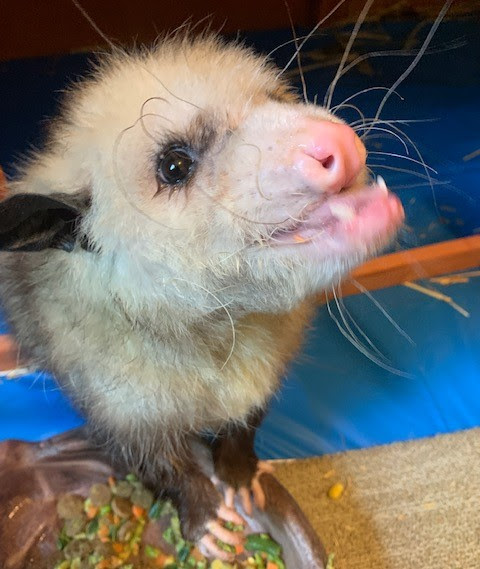By Karen Melton
Sid Sneezer is an ambassador -- a much beloved opossum that helps people learn the value of opossums and other wildlife members that are often unappreciated or even reviled.
Opossums, for example, are veritable tick vacuum cleaners. Short legged and close to the ground, they are a magnet for ticks, but clean themselves meticulously. Ticks and carrion are just some of the foods we should be grateful to opossums for eating. They are shy and harmless to people and pets, do not carry rabies, and as nocturnal animals are rarely seen.
Sid is just one of the animal ambassadors you might get to meet at one of Jackie Williams-Kent’s wildlife presentations. President of Wildlife Rehabilitation Support of Pennsylvania (WRSPA) and Education Director of Philadelphia Metro Wildlife Center (PMWC), Jackie is on a mission, with help from a Sierra Club Huplits Wildlife Grant, to teach people to respect the wildlife that lives among us, to allow them their space (after all they lived in your neighborhood before you did), and to appreciate how a diverse ecology enriches our lives.

This is the second half of the two-year grant that is enabling Jackie to bring free wildlife presentations to many school and community venues in SE PA that would be unable to pay for one. During the first year she has completed 20+ presentations as part of the grant, as well as many more under the auspices of WRSPA and PMWC.
Jackie is also a certified wildlife rehabilitator. In all of Pennsylvania there are only 28 organizations that have rehabilitators certified to care for injured and orphaned wildlife, down from 50 in 2005. The PA Fish and Game Commission manages the certification of rehabilitators. Applicants must pass an exam for each category of species they wish to care for: raptors, passerines, mammals, native reptiles and amphibians, rabies vector species, and endangered/threatened species. Of the 28 facilities in PA only 8 are certified for all species, and more than half only have a single certified rehabber.
While personnel for wildlife rehab are scarce, funding is non-existent. Wildlife rehab centers must raise all of their own money for the considerable expenses involved -- there is no public funding. In addition to staff there are incubators for orphaned babies, costly special foods and formulas, and large outdoor enclosures where a healing broken wing can be exercised, or a juvenile mammal can develop physical strength and agility. Baby birds require feeding every 30 to 60 minutes, and baby mammals every 4 hours, so wildlife care involves lots and lots of volunteers, 365 days a year.
It is illegal to keep wildlife captive; however, certified facilities are permitted to have a small number of non-releasable animals for education purposes and to act as surrogate parents for orphaned young. Sid Sneezer has a deformed jaw and breathes with an audible wheeze (thus his name). He could not survive in the wild but is an able animal ambassador, along with other species that accompany Jackie to presentations.
Thanks to the Huplits grant, hundreds of children and others of all ages are getting to meet Jackie’s animal ambassadors and learn about the wildlife around us.
Karen Melton is Education Chair of the SE PA Sierra Club group, and a volunteer with Philadelphia Metro Wildlife Center.
This is one in a series of articles about projects supported by 2018-19 Huplits wildlife grants. The annual grants are awarded and administered by the Sierra Club Allegheny Group with funding provided by the Huplits Foundation for projects involving public education, litigation, land acquisition or research directly focused on protecting PA wildlife, its habitats, and preventing cruelty to animals.